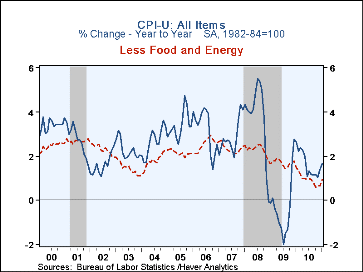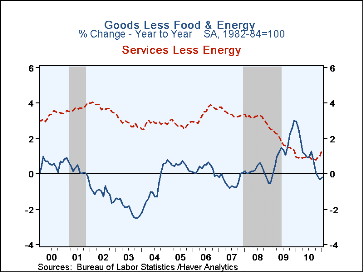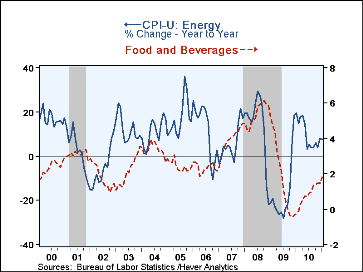 Global| Feb 17 2011
Global| Feb 17 2011U.S. CPI Is Strong With Higher Energy & Food Costs; Core Pricing Firms
by:Tom Moeller
|in:Economy in Brief
Summary
Pricing power improved last month -- everywhere. The Consumer Price Index rose 0.4% in January, the same as in December, but generally higher than prior months. Consensus expectations were for a 0.3% rise. Core price inflation bumped [...]
 Pricing power improved last month -- everywhere. The Consumer Price
Index rose 0.4% in January, the same as in December, but generally higher than
prior months. Consensus expectations were for a 0.3% rise. Core price inflation
bumped up as the CPI less food & energy rose 0.2%, its strongest increase
since October 2009. Consensus expectations were for a 0.1% uptick. The latest
figures reflect benchmark revisions of seasonal factors.
Pricing power improved last month -- everywhere. The Consumer Price
Index rose 0.4% in January, the same as in December, but generally higher than
prior months. Consensus expectations were for a 0.3% rise. Core price inflation
bumped up as the CPI less food & energy rose 0.2%, its strongest increase
since October 2009. Consensus expectations were for a 0.1% uptick. The latest
figures reflect benchmark revisions of seasonal factors.
Energy prices posted a 2.1% gain last month and by 7.5% y/y. Home heating oil prices led the increase with a 5.4% jump (NSA, 11.8% y/y) while gasoline prices advanced 3.5% for the month and by 13.4% from 12-months earlier. Prices for natural gas & electricity fell 0.6% and by 0.6% y/y. Food & beverage prices firmed with a 0.5% increase, the strongest gain since September 2008. Strength in fruits & vegetables (2.3% y/y) and meat, poultry, fish & eggs (6.2% y/y) prices lifted the monthly gain.
Core consumer pricing power firmed last month by 0.2% after months of virtually no-change. The 12-month gain improved to 0.9%. For goods alone, prices rose 0.2% after four consecutive months of slight decline. A 1.0% (-0.0% y/y) increase in apparel led the latest rise. Prices for household furnishings & operation ticked up 0.1% (-2.3% y/y) while new and used motor vehicle prices slipped for the fifth straight month (+0.5% y/y).
Pricing power for core services also improved. The 0.1% increase caused the y/y gain to rise to 1.4%. To the upside, public transportation costs again led last month's gain with a 1.7% increase (7.7% y/y). Education costs were strong and posted a 0.6% increase (4.2% y/y). Shelter costs, which are 32% of the CPI, rose 0.1% for the fourth straight month, however, the y/y change improved to 0.6% due to declines early last year. Owners equivalent rent of primary residences, a measure not equivalent to other house price measures, ticked up 0.1% while the y/y increase improved to 0.5% after no change last year. Nevertheless, the reading remained the weakest since the series' start in 1983. Medical care prices slipped 0.1% (+3.0% y/y).
The chained CPI, which adjusts for shifts in consumption patterns, rose 0.5% and 1.4% year-to-year. Chained prices less food & energy ticked up 0.1% m/m but rose 0.7% y/y.
The consumer price data is available in Haver's USECON database while detailed figures can be found in the CPIDATA database.
| Consumer Price Index (%) | Jan | Dec | Nov | Jan Y/Y | 2010 | 2009 | 2008 |
|---|---|---|---|---|---|---|---|
| Total | 0.4 | 0.4 | 0.1 | 1.6 | 1.6 | -0.3 | 3.8 |
| Total less Food & Energy | 0.2 | 0.1 | 0.1 | 1.0 | 1.0 | 1.7 | 2.3 |
| Goods less Food & Energy | 0.2 | -0.1 | -0.0 | -0.2 | 1.1 | 1.3 | 0.1 |
| Services less Energy | 0.1 | 0.1 | 0.2 | 1.4 | 0.9 | 1.9 | 3.1 |
| Energy | 2.1 | 4.0 | 0.1 | 7.5 | 9.6 | -18.2 | 13.7 |
| Food & Beverages | 0.5 | 0.1 | 0.1 | 1.8 | 0.8 | 1.9 | 5.4 |
| Chained CPI: Total (NSA) | 0.5 | 0.2 | 0.0 | 1.4 | 1.5 | -0.1 | 3.7 |
| Total less Food & Energy | 0.1 | -0.2 | -0.0 | 0.7 | 0.7 | 1.5 | 2.0 |
Tom Moeller
AuthorMore in Author Profile »Prior to joining Haver Analytics in 2000, Mr. Moeller worked as the Economist at Chancellor Capital Management from 1985 to 1999. There, he developed comprehensive economic forecasts and interpreted economic data for equity and fixed income portfolio managers. Also at Chancellor, Mr. Moeller worked as an equity analyst and was responsible for researching and rating companies in the economically sensitive automobile and housing industries for investment in Chancellor’s equity portfolio. Prior to joining Chancellor, Mr. Moeller was an Economist at Citibank from 1979 to 1984. He also analyzed pricing behavior in the metals industry for the Council on Wage and Price Stability in Washington, D.C. In 1999, Mr. Moeller received the award for most accurate forecast from the Forecasters' Club of New York. From 1990 to 1992 he was President of the New York Association for Business Economists. Mr. Moeller earned an M.B.A. in Finance from Fordham University, where he graduated in 1987. He holds a Bachelor of Arts in Economics from George Washington University.
More Economy in Brief
 Global| Feb 05 2026
Global| Feb 05 2026Charts of the Week: Balanced Policy, Resilient Data and AI Narratives
by:Andrew Cates








